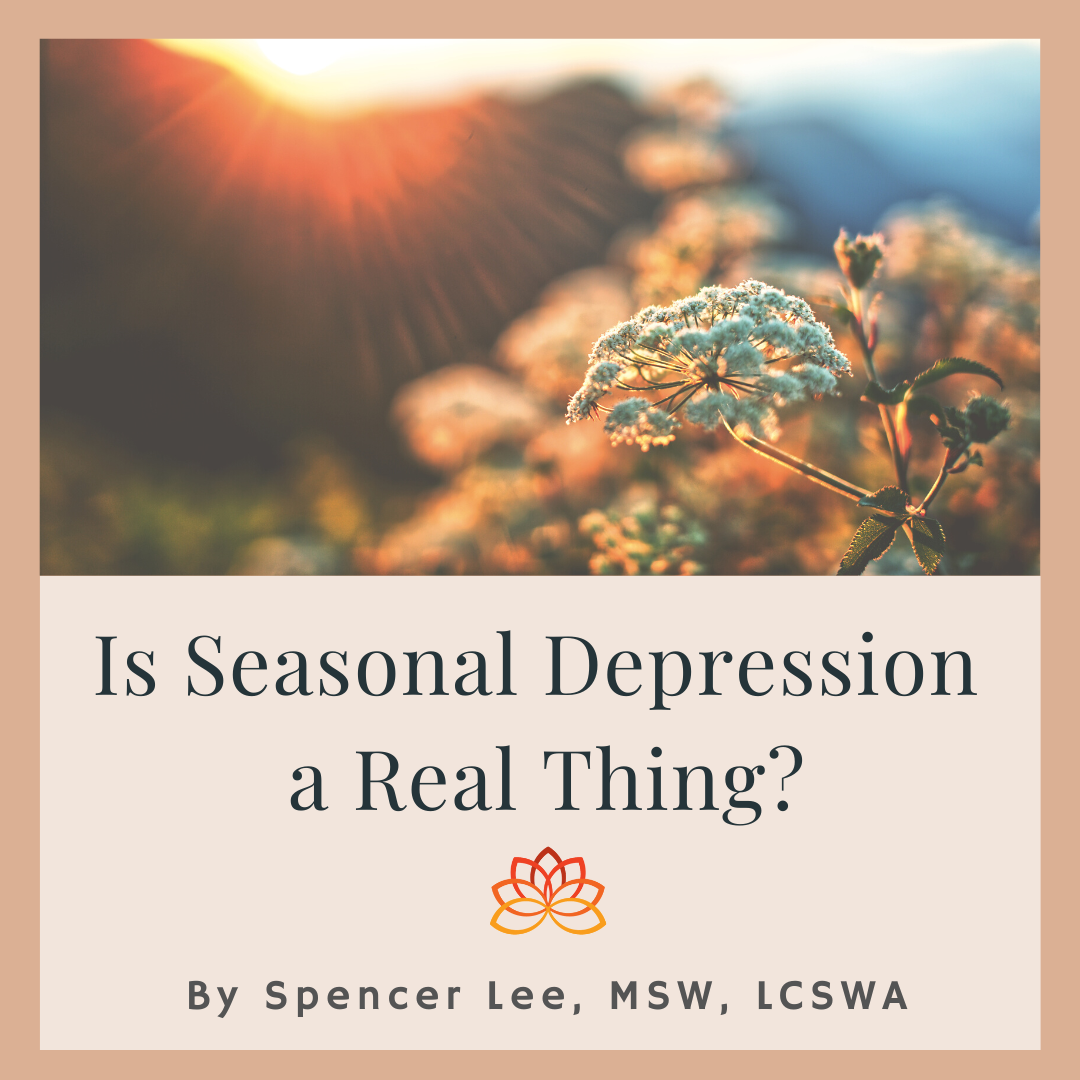Is Seasonal Depression a Real Thing?
by Spencer Lee, LCSWA

Exposure to sunshine has been shown to improve our mental and physical health in a variety of ways. Sunlight plays a major role in our melatonin production which regulates our sleep/wake cycles and has also been shown to make us less reactive to the effects of stress. The vitamin D we get from sun exposure contributes to bone density levels and even boosts our immune system. Sunlight also helps our bodies produce serotonin- the happy drug! So it is natural for us to feel happier when we have regular exposure to sunlight and don’t feel quite the same during winter months.
It seems like every year around daylight savings, we hear people talking about how “depressing” it is that the days are so much shorter. You may have even experienced this yourself- low mood, not quite as motivated as normal, increased appetite. Come spring, people often experience more energy, a stronger desire to socialize and stay out, and overall improved mood. Although, it is true that sunlight impacts our mood, feeling down and having difficulty sleeping for a bit during a change in seasons is not the same as seasonal depression.
Seasonal depression-otherwise known as seasonal affective disorder- is a type of major depressive disorder that correlates with the seasons. Seasonal affective disorder shares some of the same symptoms as major depressive disorder such as:
- Feeling depressed for most of the day, nearly every day
- Loss of interest or enjoyment in activities, events, hobbies
- Changes in weight, appetite
- Difficulty sleeping
- Difficulty concentrating
- Fatigue, low energy
- Feelings of hopelessness, worthlessness, helplessness
- Frequent thoughts of death or suicide
Contrary to popular belief, this form of depression does not always begin and end only during colder months, rather symptoms may change throughout the year. The National Institute of Mental Health has laid out additional symptoms of seasonal affective disorder that coincide with the seasons. During the summer, symptoms may include: anxiety, restlessness,weight loss, insomnia, and even violent behavior/irritability. In the winter, common symptoms include: social withdrawal, overeating, weight gain, and hypersomnia. For some, depression symptoms are absent during spring and summer while others experience the reverse.
Treatment:
Research has found several different treatments that are effective against seasonal depression. One remedy, phototherapy, is the process of increasing your exposure to sunlight. Medication can also be used to decrease depression whether this be Vitamin D to help make up for the lack of sun or antidepressants. Several psychotherapies have been shown to reduce the effects of seasonal depression as well.
Stillpoint offers counseling for depression and a variety of interventions used for depression such as cognitive behavioral therapy and mindfulness-based therapies. Therapy can be helpful through identifying factors contributing to depression such as negative thinking patterns, stress, or conflict with others and working to resolve these factors and develop healthy coping skills.
Additionally, there are a few habits we can incorporate into our lives to help fight against seasonal depression.
1. Sleep Hygiene- Our body is biologically programmed to wake and sleep as the sun rises and falls; however, our modern world does not always allow that. Going to bed and getting up at about the same time every day, as well as avoiding naps helps regulate our bodies to our own schedule, dependent from the sun. Maintaining this pattern throughout the year is an effective way to combat seasonal affective disorder.
2. Socialize- Set aside time to connect with friends and family. Isolation can be a precursor and a response to depression. Spending time with others can act as a preventive measure.
3. Exercise- Exercise releases endorphins which contribute to boosting our mood. Whether done indoors or outdoors, adopting exercise into your routine has been shown to not only reduce depression levels but also increase energy.
4. Soaking up sun- Adding more sun in your life can look like going for a jog or hanging out in a hammock. Any type of exposure can be helpful. And be sure to wear sunscreen! If getting outside is not an option for you, light boxes can be a replacement. These lights are similar to sunlight in terms of rays they emit and have been used in phototherapy to treat seasonal affective disorder.
If you or someone you know is experiencing suicidal thoughts, resources are available for you. The Suicide Hotline recently changed their number to 988 and are available 24/7 for confidential support.
Fun Fact: Last year, Congress passed the Sunshine Protection Act which will eliminate our biannual time change. So, in the fall this year we will no longer be ‘falling back an hour’. This change means the sun will be up an entire hour longer during the winter months!
Check out more of our blogs here
